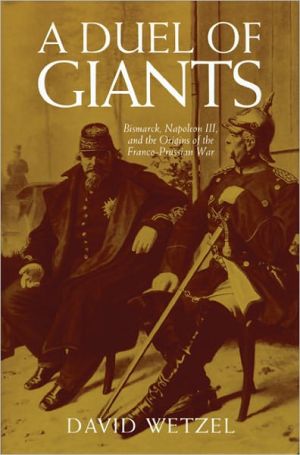

 |

|

The average rating for Duel of Giants: Bismarck, Napoleon III, and the Origins of the Franco-Prussian War based on 2 reviews is 3 stars.
Review # 1 was written on 2018-11-07 00:00:00 Desra Fraser Desra FraserI found this narrative a bit dry and academic and way too sort (less than 200 pgs of text). It's also a bit revisionist. The auhor looks at the events of 1868-1870, starting with the Spanish rebelling against the Queen Isabella II and removing her from the throne. This set off another "Who will sit on the Spanish Thorne" crisis. Of course the French and Prussians back different candidates The author puts most of the blame for the war on the French esp the Premier (Ollivier) and the Foreign Minister. Napoleon III really didn't want the war, but was too sick to control them. The author also takes the position that neither Bismarck or the Prussian King, Wilhelm I, wanted a war with France. What Prussia really wanted was a Hohenzollern on the Spanish Throne. In June of '70 the Prussian eventually back down and their candidate with draws his name from consideration. This still does not satisfy the French and when Wilhelm I eventually declines to give them some very outrageous guarantee's, the French Declare War. This is where the narrative ends and the author does not discuss the war at all. The revisionist take is that Bismarck is portrayed as mainly reacting to events rather than driving them. The author also looks at the Prussian/Bismarck's desire for a united Germany (under Prussian control of course) and the States south of the Main River (mainly Bavaria and Wurttemberg) reluctance to be assimilated in a Greater German Reich under Prussian leadership. All in all a 3 star book. |
Review # 2 was written on 2016-10-19 00:00:00 Brian Morrill Brian MorrillIn 1860 Prussia was arguably the weakest of the great powers of Europe, a Europe that hadn't changed all that much since Napoleon's downfall in 1815. Merely a decade later Prussia had humiliated first Austria and then France in two short wars and united Germany into a the most powerful state on the continent. The version that I knew of this story basically boiled down to "Bismarck played rope-a-dope with everyone and got them to fight stupid wars over stupid crap that gave Prussia an excuse to unify Germany." The truth is more complicated, unfortunately so much more complicated that if anyone asks for the short version I'm sticking with the rope-a-dope line. And this is a good time to confess that listening on audio book to this was a mistake. Even with rewinds I struggled with a lot. The book itself covers 1868 or so to 1870, so the run-up to the second war I mentioned, the Franco-Prussian war. (It doesn't give much of a run down of what happened earlier, and though I knew the outlines I would have appreciated far more.) The nominal cause for the war was a soap opera around the Spanish throne I won't even try to summarize. The French government--in which some factions wanted a war and some didn't--managed to whip the nation into a frenzy over wounded honor and disrespect, at which point they didn't think they could walk away with a diplomatic victory that didn't involve the Prussians abasing themselves. So they started a war that saw Paris occupied ended their Second Empire. The "starting the war on purpose" story from Bismarck is at best half true, and to the extent it became a meme it's because Bismarck pushed it. Which was one historical lesson from the book--it was still an age when people were proud of starting wars. But Wetzel argues pretty convincingly that Bismarck didn't want war at first--he wanted a Prussian prince in Spain. The crisis blew up unintentionally, and it was only then (and at least in part to save his own position) that Bismarck started throwing fuel on the fire. He did this skillfully; Wetzel isn't trying to diminish Bismarck. Wetzel also argues that the war was unnecessary to unify Germany and a bad idea. The basic gist is that Germany was heading towards unification anyway, so a German victory didn't gain them much except an enemy, while a French victory would have prevented unification ever. While Wetzel clearly knows more than me I'm less convinced by this, basically because a lot of the narrative does show the leaders of the minor German states hoping to avoid unification and being swept along in the nationalist anti-French struggle. I'd give this a pretty tepid recommendation. Nothing against the writing or the scholarship. If I were trying to get a reading list around mid-19th century continental European politics I'd probably include it, but on its own I felt I was missing maybe a half-dozen other books of prep work to fully appreciate this one. |
CAN'T FIND WHAT YOU'RE LOOKING FOR? CLICK HERE!!!